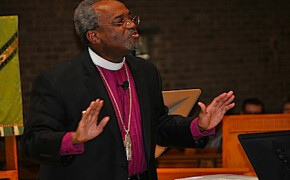Evangelism Matters Conference

Episcopalians already have the tools to ignite transformative re-evangelization of the western world, Presiding Bishop Michael Curry said in his address to about 400 followers of Christ during a Church-wide evangelism conference in Dallas.
“Evangelism is about following our way home, following Jesus. That is some of the most important work, not for our sake but for the sake of the world,” Curry said. “Evangelism doesn’t have a thing to do with a bigger church, it has everything to do with a better world.”
The Diocese of Dallas, the Episcopal Church and Forward Movement sponsored the two-day Evangelism Matters conference, which was hosted by Church of the Transfiguration. The conference brought together workshops, many led by EDOD clergy and lay leaders, about how to share your faith, cultivate an evangelistic church, engage millennials, reach refugees, and develop best practices for starting a church, among others.
Bishop George Sumner welcomed the crowd to the conference, telling them Jesus is king and rules over us. “It is not just new member acquisition or social outreach we are talking about, though I am for both, but about news of king Jesus on his way to Jerusalem, that we are here to encourage.”
A panel of experts kicked off the summit with a moderated discussion of “what is evangelism?” EDOD Evangelist, Carrie Headington told the crowd that the message of Christ needs to come from everyone, not just clergy; and added that it takes ecumenical partnerships and creativity to move the needle forward for discipleship. “We need people gossiping the Gospel,” she said.
The Rev. Alberto Cutie agreed saying that the re-evangelism movement the world needs can’t be done by the ordained alone. “Sheep make sheep, shepherds don’t make sheep. That’s a biological fact,” he joked. He also noted Christians need to highlight the Jesus of the Gospel in a way that will reach and connect to non-Christians and offered social media as the new frontier for getting the word out. “We need to be present in every form of media because it’s a way to open the door to people who don’t know Jesus,” said Cutie who is a priest in the diocese of Southeast Florida.
Curry concurred calling social media the New Roman Superhighway. “It’s a new way of knocking on doors,” he said. “Episcopalians are all over Facebook. I’ve seen your cats, I’ve seen your dogs, I have seen it all. Use the social media you are already using to bear witness to God.
As churches strategize on how to cultivate an evangelistic church, consider getting to know Judea by understanding the physical community around your church and asking what is God up to in your neighborhood, said the Rev. Stephanie Spellers, the presiding bishop’s canon for evangelism and reconciliation. Also get to know Samaria or the margins of your community, groups, generations and cultures with whom your church has been alienated, she said. And lastly, get to know the ends-of-the-earth, meaning global mission and awareness, by asking what other parts of the world and creation God is calling your church to partner with and build relationships, Spellers said
Downloading your church’s demographics from the TEC website will help leaders begin to understand their neighborhoods, she said, but it’s important to follow-up that study with physically walking the neighborhood while praying, and letting God reveal what you need to see.
For those evangelizing by starting new churches, the Rev. Mike Michie, who planted St. Andrew’s in McKinney offered sage advice including the notion that those starting a new church will need to get comfortable with stewardship. “Don’t do this work if you are scared of asking people for money,” he said. “You have to embrace the reality that you are the chief fundraiser at the church.” He also offered advice on thoughtfully choosing spiritually mature lay leaders, fully understanding diocesan expectations of the church and not launching worship before acquiring enough members to make it stick. It’s also important to understand the risks of planting a church. “Don’t start a church if you are not willing to lose every cent you put into it,” he warned. “The reality is some fail.”
Leading others to Christ can also come from unexpected places, said the Rev. Dr. Samira Izadi Page who led a workshop on how to reach refugees. Page operates Gateway of Grace ministry in Dallas, which offers practical and spiritual aid to refugees, the majority of which are Muslim. “They know we are Christian,” she said. “We love with compassion and dignity. We tell them they don’t have to believe what we believe for us to love them. They are shocked by this and not familiar with the concept of grace. It’s the opposite of what they are use to. I’ve never had a Muslim say no to prayer, they are very open.” Some of the Muslim refugees have begun to attend Bible study, which is in English but translated in Arabic and Farsi.
Others who led workshops at the conference include Diocese of Texas Bishop Andrew Doyle; Diocese of Central Florida Bishop Greg Brewer; the Rev. Casey Shobe, rector of Transfiguration; and the Rev. Chris Girata, rector of Saint Michael and All Angels.
The summit included Holy Eucharist with Sumner celebrating and Curry giving the homily. Curry summarized the strategy needed for rejuvenation of evangelism in the Church. “We already have the gifts,” he said. “We have the people, we have the brain power and we are working on the heart power.”

